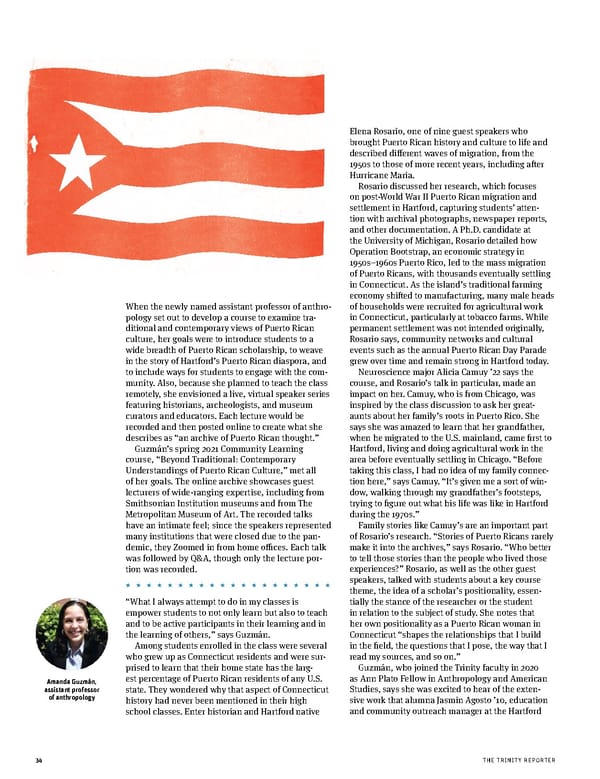Elena Rosario, one of nine guest speakers who brought Puerto Rican history and culture to life and described different waves of migration, from the 1950s to those of more recent years, including atfer Hurricane Maria. Rosario discussed her research, which focuses on post-World War II Puerto Rican migration and settlement in Hartford, capturing students’ atten- tion with archival photographs, newspaper reports, and other documentation. A Ph.D. candidate at the University of Michigan, Rosario detailed how Operation Bootstrap, an economic strategy in 1950s–1960s Puerto Rico, led to the mass migration of Puerto Ricans, with thousands eventually settling in Connecticut. As the island’s traditional farming economy shitfed to manufacturing, many male heads When the newly named assistant professor of anthro- of households were recruited for agricultural work pology set out to develop a course to examine tra- in Connecticut, particularly at tobacco farms. While ditional and contemporary views of Puerto Rican permanent settlement was not intended originally, culture, her goals were to introduce students to a Rosario says, community networks and cultural wide breadth of Puerto Rican scholarship, to weave events such as the annual Puerto Rican Day Parade in the story of Hartford’s Puerto Rican diaspora, and grew over time and remain strong in Hartford today. to include ways for students to engage with the com- Neuroscience major Alicia Camuy ’22 says the munity. Also, because she planned to teach the class course, and Rosario’s talk in particular, made an remotely, she envisioned a live, virtual speaker series impact on her. Camuy, who is from Chicago, was featuring historians, archeologists, and museum inspired by the class discussion to ask her great- curators and educators. Each lecture would be aunts about her family’s roots in Puerto Rico. She recorded and then posted online to create what she says she was amazed to learn that her grandfather, describes as “an archive of Puerto Rican thought.” when he migrated to the U.S. mainland, came ifrst to Guzmán’s spring 2021 Community Learning Hartford, living and doing agricultural work in the course, “Beyond Traditional: Contemporary area before eventually settling in Chicago. “Before Understandings of Puerto Rican Culture,” met all taking this class, I had no idea of my family connec- of her goals. The online archive showcases guest tion here,” says Camuy. “It’s given me a sort of win- lecturers of wide-ranging expertise, including from dow, walking through my grandfather’s footsteps, Smithsonian Institution museums and from The trying to ifgure out what his life was like in Hartford Metropolitan Museum of Art. The recorded talks during the 1970s.” have an intimate feel; since the speakers represented Family stories like Camuy’s are an important part many institutions that were closed due to the pan- of Rosario’s research. “Stories of Puerto Ricans rarely demic, they Zoomed in from home oiffces. Each talk make it into the archives,” says Rosario. “Who better was followed by Q&A, though only the lecture por- to tell those stories than the people who lived those tion was recorded. experiences?” Rosario, as well as the other guest speakers, talked with students about a key course ******************** theme, the idea of a scholar’s positionality, essen- “What I always attempt to do in my classes is tially the stance of the researcher or the student empower students to not only learn but also to teach in relation to the subject of study. She notes that and to be active participants in their learning and in her own positionality as a Puerto Rican woman in the learning of others,” says Guzmán. Connecticut “shapes the relationships that I build Among students enrolled in the class were several in the ifeld, the questions that I pose, the way that I O who grew up as Connecticut residents and were sur- read my sources, and so on.” prised to learn that their home state has the larg- Guzmán, who joined the Trinity faculty in 2020 CAIT CK est percentage of Puerto Rican residents of any U.S. as Ann Plato Fellow in Anthropology and American NI Amanda Guzmán, ) assistant professor state. They wondered why that aspect of Connecticut Studies, says she was excited to hear of the exten- GHT RI ( of anthropology history had never been mentioned in their high sive work that alumna Jasmin Agosto ’10, education : O school classes. Enter historian and Hartford native and community outreach manager at the Hartford T PHO 34 THE TRINITY REPORTER
 The Trinity Reporter, Fall 2021 Page 35 Page 37
The Trinity Reporter, Fall 2021 Page 35 Page 37